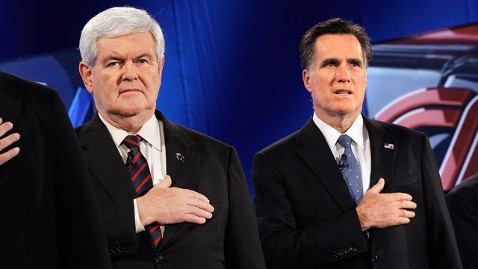'World News' Political Insights: Bad Blood Between Mitt Romney, Newt Gingrich Will Linger

(Chip Somodevilla/Getty Images)
The Republican Party is poised to move a big step closer to landing on its presidential nominee this week.
But the party will be simultaneously taking a big step away from being happy with that nominee.
Mitt Romney is roaring into the Florida primary on Tuesday having recaptured the momentum he lost last weekend in South Carolina. He's done it the same way his allies vaulted him back into contention in Iowa after several shaky weeks: with a relentless, brutal assault on his chief rival, Newt Gingrich.
But drawing bad blood has consequences - and that could mean a bitter primary race that lasts far longer than the Romney campaign would have hoped.
The response from Gingrich and the Republican grass-roots suggests that even if Romney essentially locks up the nomination within weeks, it will be months before he can hope to patch up a divided party.
Gingrich is accusing Romney not just of liberal and moderate viewpoints, but of a craven dishonesty in his attacks - the kind of dishonesty that will make it seem strained at best when and if Gingrich throws his support behind Romney for the general election. He's using the attacks to fuel an argument that Romney simply can't beat President Obama in November.
Sarah Palin, speaking to the tea party activists and other base conservatives, is emerging as Gingrich's chief ally in arguing for the campaign to continue. Her voice was reinforced by that of former candidate Herman Cain, whose endorsement of Gingrich Saturday puts an exclamation point on the split between the party's establishment and anti-establishment wings.
"The conservatives clearly are rejecting Romney," Gingrich said today on ABC's "This Week." "And so this is going to go on all the way to the convention."
Whether or not Gingrich makes good on that threat, the math is on his side - not Romney's. The proportional allotment of delegates in early-voting states, coupled with a scattershot primary schedule where Super Tuesday is only half as supersized as it was four years ago, means it's extraordinarily difficult for a candidate to amass enough delegates to clinch the nomination until at least late April.
That means the chief rivals to the frontrunner would have to go away quietly for the nomination to get wrapped up early.
There are no signs of that happening. Even if Gingrich and Romney were on friendly terms, there's still the issue of Ron Paul - who has no incentive to do anything other than collect delegates over the coming months - not to mention Rick Santorum, who still fashions himself the true Romney alternative.
Romney's take-it-to-Gingrich approach has played out at the most recent debates, and through scorched-earth ads that dredge up decades-old Gingrich lowlights, plus Gingrich's more recent work for housing giant Freddie Mac.
Polls in Florida strongly suggest that the strategy has worked. The Romney attack has reversed his own slide and brought Gingrich down several pegs, while the former House speaker hasn't done himself many favors with his rhetorical journeys to outer space.
But those same attacks that weaken Gingrich could be what makes the primary season lasts even longer. There's an argument to be made that an elongated primary season will help the eventual nominee, but the betting at Obama headquarters these days is quite the opposite.